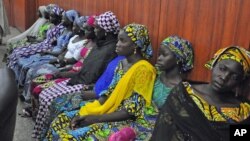Nigerian officials say 219 girls remain unaccounted for after being kidnapped by Boko Haram militants in April.
The latest figures on the number of missing girls come from a final report released by a government fact-finding committee appointed by President Goodluck Jonathan.
Submitting the final report, Brigadier General Ibrahim said Friday that the militants initially took 276 girls, but 57 escaped — either as the trucks drove away or soon after.
Sabo said his committee members met with resistance when they visited Chibok last month to talk to some of the escaped girls. The militants raided a secondary school in Chibok village and forced the students onto trucks.
"The four girls were hesitant to discuss full details of their experience, citing fears of possible reprisal from the Boko Haram elements," he said. "In fact, parents of the other girls who escaped were hidden from public glare, also because of fear of reprisals."
Speaking at the Nigerian State House in Abuja Friday, Jonathan renewed vows to find the girls and crush Boko Haram.
He also said his government is looking at social and economic factors that may be driving the insurgency.
"So government is not only making efforts at military or security operations alone," he said. "We are looking at various economic issues to improve the welfare of citizens."
Many Nigerians have criticized the government for failing to rescue the girls or put a stop to the five-year insurgency by Boko Haram, which says it is trying to establish an Islamic state in northern Nigeria. The group has killed thousands of people in attacks on schools, markets, churches, mosques and other public places.
The Chibok kidnapping and other increasingly bloody attacks by Boko Haram have underscored Abuja's inability to stamp out the militant group, which aims to carve out a radical Islamist state in the mostly Muslim north.
In what could raise the ire of Jonathan's critics, Sabo recommended the findings of the fact-finding group appointed by the president remain confidential for national security reasons.
Sabo also seemed to try to deflect expected criticism from the government.
"For the Chibok schoolgirls, little will be achieved through finger-pointing,'' he said in his statement. "Getting the girls out, and safely, too, is by far more important than the publicity generated by the blame game that has tended to becloud the issue.''
Last month, the U.S. sent military and intelligence personnel to Nigeria to help the government locate and rescue the missing girls. U.S. drones based in neighboring Chad have flown surveillance flights over the search area.
Material from Reuters was used in this report.
The latest figures on the number of missing girls come from a final report released by a government fact-finding committee appointed by President Goodluck Jonathan.
Submitting the final report, Brigadier General Ibrahim said Friday that the militants initially took 276 girls, but 57 escaped — either as the trucks drove away or soon after.
Sabo said his committee members met with resistance when they visited Chibok last month to talk to some of the escaped girls. The militants raided a secondary school in Chibok village and forced the students onto trucks.
"The four girls were hesitant to discuss full details of their experience, citing fears of possible reprisal from the Boko Haram elements," he said. "In fact, parents of the other girls who escaped were hidden from public glare, also because of fear of reprisals."
Speaking at the Nigerian State House in Abuja Friday, Jonathan renewed vows to find the girls and crush Boko Haram.
He also said his government is looking at social and economic factors that may be driving the insurgency.
"So government is not only making efforts at military or security operations alone," he said. "We are looking at various economic issues to improve the welfare of citizens."
Many Nigerians have criticized the government for failing to rescue the girls or put a stop to the five-year insurgency by Boko Haram, which says it is trying to establish an Islamic state in northern Nigeria. The group has killed thousands of people in attacks on schools, markets, churches, mosques and other public places.
The Chibok kidnapping and other increasingly bloody attacks by Boko Haram have underscored Abuja's inability to stamp out the militant group, which aims to carve out a radical Islamist state in the mostly Muslim north.
In what could raise the ire of Jonathan's critics, Sabo recommended the findings of the fact-finding group appointed by the president remain confidential for national security reasons.
Sabo also seemed to try to deflect expected criticism from the government.
"For the Chibok schoolgirls, little will be achieved through finger-pointing,'' he said in his statement. "Getting the girls out, and safely, too, is by far more important than the publicity generated by the blame game that has tended to becloud the issue.''
Last month, the U.S. sent military and intelligence personnel to Nigeria to help the government locate and rescue the missing girls. U.S. drones based in neighboring Chad have flown surveillance flights over the search area.
Material from Reuters was used in this report.





